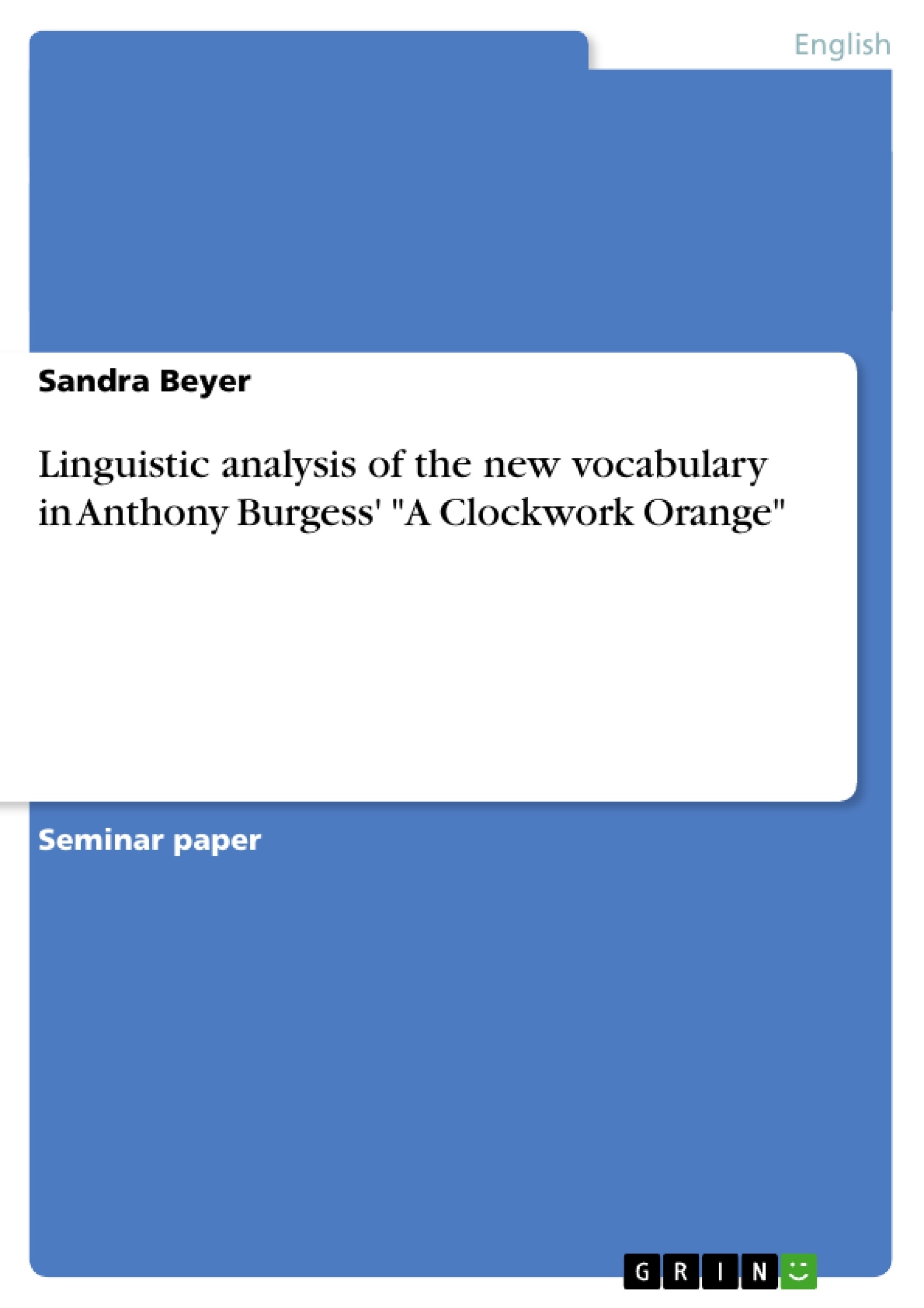Excerpt
Table Of Contents
1. Introduction
2. Phonetics
3. Syntax
4. Coherence
5. Morphology
6. Semantics
7. About the narrator
8. Conclusion
9. Bibliography
1. Introduction
Perhaps the most remarkable thing about the present extract from Anthony Burgess´ “A Clockwork Orange” is its language. Alex, the writer of the book, uses a great number of unusual words that seem to be freely invented by the author. By having a closer look at them, it can be noted that many of them have their origin in the Russian language.
In this essay I will survey these unusual words and try to expose if they are phonetically, morphologically, syntactically or semantically different from “real” English words or if they could be called Anglicism according to one of the above topics. Therefore I am going to try to give a phonetic transcription of some of the new words and their corresponding Russian expressions and compare them.
Then I am going to have a closer look at the word order of the present extract and try to put the new words into their corresponding syntactical categories. I will as well show how the sentences are connected and what lexical or grammatical properties make the extract coherent.
In addition I am going to specify some of the Anglicism in the text and intend to explain how they are built .I also will try to make clear the thematic roles of one example sentence to facilitate its interpretation. Finally I am going to present what in my opinion could be said about the author’s background and education, according to the text.
2. Phonetics
1.horrorshow – “khorosho”[1]
Looking at the transliteration of the Russian word “khorosho” (good, well) the following pronunciation can be deduced: “kh” has to be pronounced as “h in house”, “r” as “rolled r in roll”, “sh” as “sh in shut” and “o” as “o in folk”[2].
Therefore the transcription of this word must be as follows: [həurəu Abbildung in dieser Leseprobe nicht enthalten əu]. A phonetic similarity with the English words “horror” and “show” [h Abbildung in dieser Leseprobe nicht enthaltenr ə(r) Abbildung in dieser Leseprobe nicht enthalten əu]
can easily be noted. The only difference is that there are three diphthongs [əu]
in “khorosho” , whereas in “horrorshow” there are two lax vowels [ Abbildung in dieser Leseprobe nicht enthalten ] and [ə] one diphthong [əu].
2. malenky – “malyenkiyi”
According to the this transliterating guide the word “malyenkiyi” (small) must be transcribed as [m a: l e n k i: j i:]
Malenky could have the following transcription [m a: l e n k i]
Burgess here leaves out the voiced palatal glide [j] w hich in English normally functions as an initial glide like in “yes”. In this case the ending of the new word malenky still sounds like [i].
3. itty – “idti”
Comparing the two phonetic transcriptions [iti] - [idti] it can be noted that Burgess eliminates the voiced alveolar stop [d] which in “real” English is normally not combined with the voiceless alveolar stop [t].
The spellings of the Russian words were probably changed by Anthony Burgess to resemble English words because like this they look more familiar to English readers and facilitate their reading. Persons knowing no Russian would interpret the spellings of these words in different ways. They would adjust the segment sequences of the unusual words to conform with the pronunciation requirements of their own language. This results from a tactic knowledge of the permissible syllable structures of their own language. The word “slooshy” would probably be interpreted as [slu Abbildung in dieser Leseprobe nicht enthalteni ] or [slu:Abbildung in dieser Leseprobe nicht enthaltenai] by an English speaker, as in English “oo” can sound as [u] like in “boot” or as [u:] like in “foot”; “sh” is pronounced as [ Abbildung in dieser Leseprobe nicht enthalten ] like in “Shirley”; and “y” as [i] like in “pretty” or as [ai] like in “shy”. In German the transcription would look like [slosi] as “oo” has to be pronounced as [o] like in “Boot”. “sh” would sound as [s] as in German the “h” does not sound if its positioned after an consonant, like in “Theater”.
[...]
[1] „Nadsat Translation Guide“: http://www.jake.chem.unsw.edu.au/-michaels/Orange/nadsat.html
[2] „The Russian Alphabet“: http://www.geocities.com/colosseum/Track/7635/alphabet.html
- Quote paper
- Sandra Beyer (Author), 2000, Linguistic analysis of the new vocabulary in Anthony Burgess' "A Clockwork Orange", Munich, GRIN Verlag, https://www.grin.com/document/22384
Publish now - it's free






















Comments